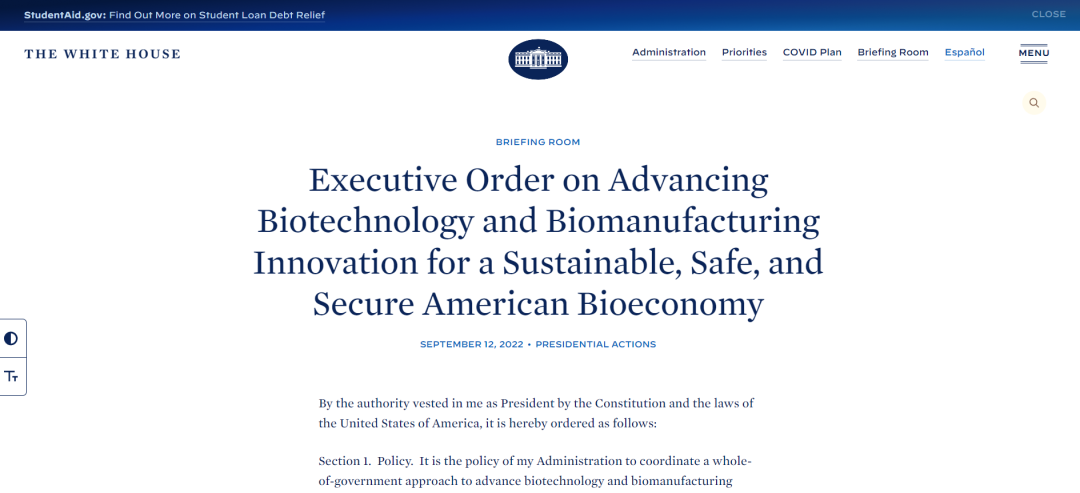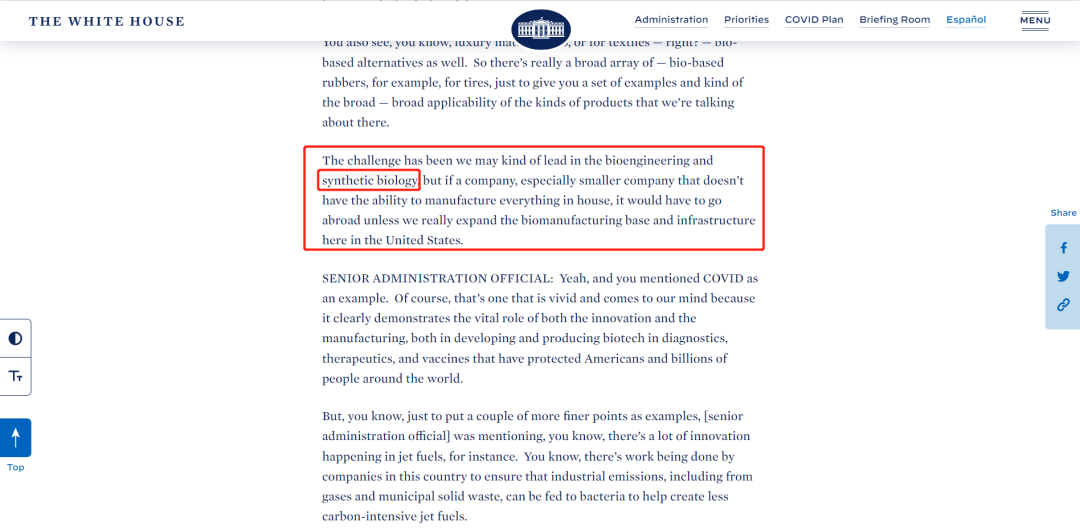On September 12, 2022, the White House website released a fact sheet announcing that U.S. President Joe Biden had signed an executive order to launch a National Biotechnology and Biofufacture Initiative.(National Biotechnology and Biomanufacturing Initiative).

The accompanying fact sheet from the White House describes the plan in context as follows: “With biotechnology, we can program microbes,To make special chemicals and compounds, a process called biofabrication.These advances have prompted industry to embrace bio-manufacturing as a petroleum-based alternative to reshaping products such as plastics, fuels, materials and pharmaceuticals. Industry analysis suggests that bioengineering could account for more than a third of global manufacturing output before the end of the century, It's worth close to $30 trillion.”Obviously, at the heart of this project, A direct reference to synthetic biology and downstream manufacturing. Earlier, in a Sunday conference call, senior U.S. officials went even further when asked to explain the plan: "One challenge is: We may be leading the way in bioengineering and synthetic biology,But if a company, especially a small company that doesn't have the ability to make everything in-house, unless we really expand the biofufacturing base, it has to go abroad and find the infrastructure."

Below is the full White House fact sheet on the initiative, which details the issue background, industry background, and actions.


Today, President Biden signed an executive order to launch a National Biotechnology and Biofumanufacturing Initiative to ensure that everything invented in the United States can be made here at home.
This plan will create jobs here at home, build stronger supply chains, and lower prices for American families. On Wednesday, the White House will host the National Biotechnology and Biomanufacturing Initiative Summitf, That's when Cabinet agencies will announce a series of new resource commitments that will enable the United States to fully harness the potential of biotechnology and biofuturing, and move forward with Biden's executive order. At present, global industry is on the cusp of an industrial revolution driven by biotechnology. Countries are positioning themselves as global providers of biotechnology solutions and products.Currently, the United States is too dependent on foreign raw materials and biological production, and in the past, offshoring of key industries, including biotechnology, has threatened its ability to acquire raw materials such as important chemicals and active pharmaceutical ingredients. But the bioeconomy remains a strength for the US, given its industry, innovators and strong research companies, and it is also a huge opportunity. By responsibly using biotechnology and biofuturing, people will be able to realize the potential of biology to make almost anything that people use in their daily lives, from drugs to fuels to plastics. With biotechnology, we can program microbes to make special chemicals and compounds, a process called biofuturing. These advances have prompted industry to embrace bio-manufacturing as a petroleum-based alternative to reshaping products such as plastics, fuels, materials and pharmaceuticals. Industry analysis suggests that bioengineering could account for more than a third of global manufacturing output, worth close to $30tn, before the end of the century. The plan will accelerate biotechnology innovation and grow America's bioeconomy in a variety of industries, including health, agriculture and energy.This initiative will advance biofufacturers, replace fragile supply chains from abroad with strong ones here at home, and support high-paying jobs in communities across the United States. The initiative will improve food and energy security, promote agricultural innovation, and mitigate the impacts of climate change. It will help people live longer, healthier lives through advances in medicine. Specifically, the plan will:
To increase domestic bio-manufacturing capacity in the United States.Today, because of a lack of infrastructure in the United States, many American biological companies do their manufacturing abroad. The initiative will build, revitalize, and protect America's national infrastructure for biofuturing, including by investing in regional innovation and enhancing biology education, while strengthening the U.S. supply chain for producing domestic fuels, chemicals, and materials;
Expand market opportunities for bio-based products. The program is the standard for sustainable procurement by government agencies that both provide alternatives to petroleum products and support well-paying jobs for American workers. The plan would increase mandatory biologically-based purchases by federal agencies,This includes by training and supporting contracting officers, and ensuring that the Office of Management and Budget and the USDA issue regular progress assessments.
And by doing that,The program will provide the industry with specific guidance on the selection gap in biology-based products, thereby creating new products and new markets.Together, the plan will develop and strengthen the BioFirst program, increase the use of renewable agricultural materials, and enable American companies to continue to lead the world in bioinnovation;
Drive research and development (R&D) to solve our biggest challenges. Focused government support for biotechnology can quickly lead to solutions,Like the mRNA vaccine pioneered during the COVID-19 pandemic. The initiative will guide federal agencies in identifying priority research and development needs to translate bioscience and biotechnology discoveries into medical breakthroughs, climate change solutions, food and agriculture innovations, and stronger U.S. supply chains;
Improve access to quality national data. Combining biotechnology with massive computing power and artificial intelligence could lead to major breakthroughs in health, energy, agriculture and the environment.Data from the Bioeconomy Initiative will ensure that biotechnology developers can simplify access to high quality, secure and extensive biodata sets,These data sets can contribute to solving pressing social and global problems;
Cultivate a diverse skilled workforce. The United States is facing a shortage of relevant talent at all levels, from community colleges to graduate schools. The initiative will expand training and educational opportunities in biotechnology and biofuturing for all Americans, with a focus on promoting racial and gender equity and supporting talent development in underserved communities;
Simplify regulations for biotechnology products. Advances in biotechnology are rapidly changing the landscape of agriculture, industry, technology and medical products, which could pose challenges for developers and innovators.The plan will improve the clarity and efficiency of the regulatory process for biotechnology products,So that valuable inventions and products can get to market more quickly without sacrificing safety;
Promote biosafety to reduce risks. The program will prioritize investment in applied biosafety research and incentivize biosafety innovation to reduce risk throughout the biotechnology R&D life cycle;
Protecting the American biotechnology ecosystem. The plan will protect the U.S. biotechnology ecosystem by advancing privacy standards and practices for human biodata, cybersecurity practices for biodata, standard development for biology-related software, and mitigation measures for risks posed by foreign competitors participating in the biofufacufactionsupply chain;
Build a prosperous and secure global bioeconomy with partners and Allies. The initiative promotes international cooperation to use biotechnology and biofuturing to address the most pressing global challenges, from climate change to health security, and to work together to ensure that biotech products are developed and used in line with democratic ethics and values, and that breakthroughs in biotechnology benefit all citizens.

 English
English
 中文简体
中文简体


